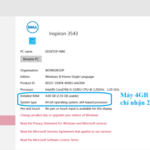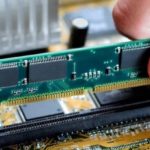One of the most important components when building a new computer case is the motherboard. It helps users determine which other hardware components are compatible, whether the motherboard supports upgrading to other components such as CPU, graphics card, sound card… when needed or not, and most importantly, the price of the motherboard.
H61 motherboard is one of the motherboards that has received a lot of attention from users because of its many advantages, high compatibility and upgradeability, and affordable price. So in this article, we will learn about the H61 motherboard and see which CPUs it supports.
What is H61 motherboard?
Before we find out which CPUs the H61 motherboard supports, let’s find out what the H61 motherboard is. The H61 motherboard is a type of motherboard produced for use with Intel Core 2nd and 3rd generation processors. This H61 motherboard is usually used in desktop computers and supports basic features of a regular motherboard such as RAM slots, PCIe slots, USB ports, SATA ports…
/fptshop.com.vn/uploads/images/tin-tuc/171864/Originals/main-h61-tim-hieu-ve-main-h61-va-chi-tiet-main-h61-ho-tro-cpu-nao-5.jpg)
In fact, the H61 motherboard uses Intel’s H61 chipset, in which the H61 chipset is a compact version of the H67 chipset, supporting 2nd and 3rd generation Intel CPUs using socket 1155. This is also one of the most commonly used motherboards in the past due to its reasonable price and many features.
Advantages and disadvantages of the H61 motherboard
Here are the details of the advantages and disadvantages of the H61 motherboard that users need to note:
1. Advantages:
- Low cost: This is certainly one of the first advantages that makes the H61 motherboard popular, which is its lower price compared to other types of motherboards. It is also a suitable choice for most ordinary users who want to build a low-cost computer system.
- High compatibility: Unlike other types of motherboards, the H61 motherboard can be connected to various types of CPUs, RAM, VGA, hard drives, and other peripherals, providing users with expandability and flexible upgrades. This is also one of the core factors that make the H61 motherboard truly attractive.
/fptshop.com.vn/uploads/images/tin-tuc/171864/Originals/main-h61-tim-hieu-ve-main-h61-va-chi-tiet-main-h61-ho-tro-cpu-nao-2.jpg)
- Expected performance: Despite its low cost, the H61 motherboard can still provide good performance for a computer system relative to its price, meeting the needs of office work, studying, web browsing, watching movies, or playing light games.
- Compact size: It has a compact size, suitable for many types of computer cases.
- SATA 6Gb/s support: Provides faster data transmission speed than SATA 3Gb/s.
- Socket 1155: Allows installation of various types of CPU.
2. Disadvantages:
- No support for USB-C and Thunderbolt: Because it is in the low-price segment, the H61 motherboard does not support advanced connection standards such as the latest USB-C and Thunderbolt. This is also the biggest drawback of the H61 motherboard compared to newer types of motherboards.
- No support for CPU processing speed: Because it is in the low-price segment, the H61 motherboard does not support advanced features such as overclocking, Turbo Boost, or Hyper-threading. These are features commonly used by gamers and users who use computers for graphics purposes.
- Limited RAM slots: Unlike other types of motherboards, the H61 motherboard only has 2 RAM slots and supports expanding RAM up to a maximum of 16GB, meeting basic usage needs.
/fptshop.com.vn/uploads/images/tin-tuc/171864/Originals/main-h61-tim-hieu-ve-main-h61-va-chi-tiet-main-h61-ho-tro-cpu-nao-6.jpg)
- No multi-GPU support: Similar to the limited RAM slots. The H61 motherboard does not support connecting multiple graphics cards at the same time, thus reducing the ability to upgrade graphics cards if gamers need or graphics processing capabilities.
- Only support PCI Express connection: As we know, PCI Express connection usually has low transmission speed, which also means that users can only use a low VGA instead of the newest VGA.
What RAM does the H61 motherboard support?
The H61 motherboard can support DDR3 RAM with a maximum bus of 1600MHz. However, users need to pay attention to the following factors when choosing RAM for the H61 motherboard:
- Number of RAM slots: The H61 motherboard only has 2 RAM slots, so right from the start, you should choose RAM with high capacity to maximize expansion capabilities when needed.
- CPU compatibility: The H61 motherboard supports 2nd and 3rd generation CPUs of Intel, so you should choose RAM with a bus that is compatible with your CPU. In the case of RAM with a higher bus than the CPU, it will automatically decrease to match the current CPU.
- Brand and warranty: You should choose RAM used for the H61 motherboard from reputable brands such as Kingston, Corsair, G.Skill, Team… to ensure quality and warranty.
Popular H61 motherboard types
Because of its popularity, the H61 motherboard is produced by many different manufacturers such as Asus, MSI, Gigabyte… Each type of motherboard from each manufacturer has its own characteristics and features, but they are all based on the H61 chipset with processors (CPUs) of Intel’s 2nd and 3rd generations, using socket 1155. There are many manufacturers producing H61 motherboards, but the most popular codes include:
- Asus H61 motherboard: H61M-A, H61M-C, H61M-E, H61M-K, H61M-G, H61-PLUS, H61-PRO, H61M-AS/M32AAS, H61M-AG/M33AAG, H61H2-M2, P8H61-M, P8H61-M-LX, P8H61-M-LX3, P8H61-M PLUS, P8H61-M PRO, P8H61-MLE, P8H61-MBM6630-8.
- Asrock H61 motherboard: H61 Pro, H61iCafe, H61M, H61M/U3S3, H61M-DG3, H61M-DGS, H61M-GE, H61M-GS, H61M-HG4, H61M-HVS, H61M-ITX, H61M-S, H61M-S1 PLUS, H61M-VG3, H61M-VG4, H61M-VS, H61M-VS3, H61M-VS4, H61M-PS, H61M-PS2, H61M-PS4.
/fptshop.com.vn/uploads/images/tin-tuc/171864/Originals/main-h61-tim-hieu-ve-main-h61-va-chi-tiet-main-h61-ho-tro-cpu-nao-7.jpg)
- MSI H61 motherboard: H61M-E22/W8, H61M-E23/B3, H61M-E33/B3, H61M-P20/G3, H61M-P21/B3, H61M-P22/B3, H61M-P23/B3, H61M-P25/B3, H61M-P31/W8, H61M-P32/W8, H61M-P35/B3, H61MA-E35/B3, H61MU-E35/B3, H61I-E35/B3, H61M-E33/W8, H61M-P31/G3, H61M-P33/B3, H61M-P33/W8, H61M-P35/W8, H61M-P31/W8, H61M-P32/W8.
/fptshop.com.vn/uploads/images/tin-tuc/171864/Originals/main-h61-tim-hieu-ve-main-h61-va-chi-tiet-main-h61-ho-tro-cpu-nao-8.jpg)
- Gigabyte H61 motherboard: GA-H61M-DS2, GA-H61M-DS2 DVI, GA-H61M-DS2 HDMI, GA-H61M-DS2 R3, GA-H61M-DS2H, GA-H61M-DS2V, GA-H61M-HD2, GA-H61M-S1, GA-H61M-S2-B3, GA-H61M-S2P, GA-H61M-S2P-B3, GA-H61M-S2P-R3, GA-H61M-S2PH, GA-H61M-S2PV, GA-H61M-S2V-B3, GA-H61M-S2V-R3, GA-H61M-USB3-B3, GA-H61M-USB3H, GA-H61M-WW, GA-H61N-D2V, GA-H61N-USB3.
Which CPUs does the H61 motherboard support?
The H61 motherboard supports Intel’s main CPUs, including: Intel Pentium, Intel Core i3, Intel Core i5, and Intel Core i7 using socket 1155. Please see the table below for details on which CPUs the H61 motherboard supports:
| CPU Name | Clock Speed | L3 Cache | Turbo Boost |
|---|---|---|---|
| Pentium G2010 | 2.8 GHz | 3 MB | No |
| Pentium G2020 | 2.9 GHz | 3 MB | No |
| Pentium G2030 | 3 GHz | 3 MB | No |
| Pentium G2120 | 3.1 GHz | 3 MB | No |
| Pentium G2130 | 3.2 GHz | 3 MB | No |
| Pentium G2140 | 3.3 GHz | 3 MB | No |
| Core i3-2100 | 3.1 GHz | 3 MB | No |
| Core i3-2100T | 2.5 GHz | 3 MB | No |
| Core i3-2102 | 3.1 GHz | 3 MB | No |
| Core i3-2105 | 3.1 GHz | 3 MB | No |
| Core i3-2120 | 3.3 GHz | 3 MB | No |
| Core i3-2120T | 2.6 GHz | 3 MB | No |
| Core i3-2130 | 3.4 GHz | 3 MB | No |
| Core i3-3210 | 3.2 GHz | 3 MB | No |
| Core i3-3220 | 3.3 GHz | 3 MB | No |
| Core i3-3240 | 3.4 GHz | 3 MB | No |
| Core i5-2300 | 2.8 GHz | 6 MB | Yes |
| Core i5-2310 | 2.9 GHz | 6 MB | Yes |
| Core i5-2320 | 3 GHz | 6 MB | Yes |
| Core i5-2400 | 3.1 GHz | 6 MB | Yes |
| Core i5-2500 | 3.3 GHz | 6 MB | Yes |
| Core i5-3330 | 3 GHz | 6 MB | Yes |
| Core i5-3340 | 3.1 GHz | 6 MB | Yes |
| Core i5-3450 | 3.1 GHz | 6 MB | Yes |
| Core i5-3470 | 3.2 GHz | 6 MB | Yes |
| Core i5-3550 | 3.3 GHz | 6 MB | Yes |
| Core i5-3570 | 3.4 GHz | 6 MB | Yes |
| Core i7-2600 | 3.4 GHz | 8 MB | Yes |
| Core i7-3770 | 3.4 GHz | 8 MB | Yes |
/fptshop.com.vn/uploads/images/tin-tuc/171864/Originals/main-h61-tim-hieu-ve-main-h61-va-chi-tiet-main-h61-ho-tro-cpu-nao-1.jpg)
In reality, the H61 motherboard is not a powerful motherboard because it does not support the latest components and has average performance. However, when building a hardware configuration with other components, the H61 motherboard is enough to meet the needs of basic office work, studying, web browsing, watching movies, or playing light games.
Should you buy the H61 motherboard or a newer one?
This is a fairly common question when users build a new desktop computer. To get the appropriate answer, you need to consider your usage needs, budget, and the compatibility of other components.
If you only use the computer for basic tasks, such as office work, studying, web browsing… then the H61 motherboard is a reasonable and cost-saving choice. However, if you want to use the computer for more demanding tasks, such as gaming, graphics, video processing… then the H61 motherboard will certainly not meet expectations and at this time choosing a newer motherboard will provide higher performance and better support.
Conclusion
Hopefully, the information shared above has helped you understand the important information about the H61 motherboard, in which you have understood what the H61 motherboard is and which CPUs the H61 motherboard supports. After understanding the H61 motherboard, you can find and buy one that suits your usage needs.




































